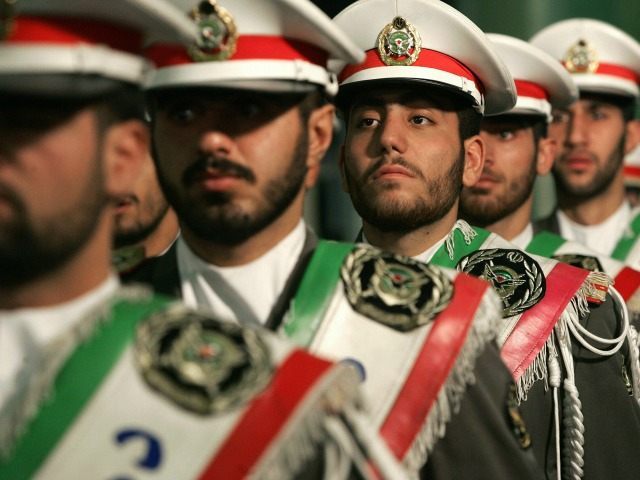Days away from implementation day of the nuclear deal with Iran, Friday prayers in Mashhad took direct aim at the United States by using the recent hostage situation in the Persian Gulf as a propaganda tool to suggest the U.S. is weak and powerless against Iran’s Revolutionary Guard Corps (IRGC).
During his sermon, hardline Iranian cleric Ayatollah Seyyed Ahmad Alamolhoda said that for the last 37 years, the U.S. has been like a “barking dog” lacking the strength to enter their nation. Using the recent incident in the Persian Gulf, near Farsi Island, where the IRGC’s Navy took 10 American sailors hostage, he said the captives were so frightened and intimidated by the faces of the IRGC Naval forces that their hands “involuntarily went over their heads” in a show of surrender as their boats were approached by the Iranian militants. The sermon was reported on by the state-run Fars News Agency.
The IRGC is Iran’s most powerful political force and operates under the guidance of Iran’s Supreme Leader Ayatollah Khamenei. Despite an alert to Iran that the U.S. Navy was deploying one of its vessels as part of a search and rescue effort for 10 sailors who allegedly veered off course, the IRGC still went ahead and took those sailors captive, in a confrontation that had the potential to escalate into an act of war.
CNN reports that the American sailors who were taken hostage were told to “act happy” by their captors while they were being taped. Meanwhile, several headlines coming out of Iran sought to show the IRGC’s strength over the U.S. One in particular, coming out of a publication called Hemayat, had a headline reading “The Apology of the Americans Under the Shadow and Strength of the IRGC.” It explained that the Americans were released into international waters after promising to never make the same mistake again and apologizing to their nation under the supervision of the naval forces of the IRGC.
Friday’s sermon in Mashhad fell on the anniversary of the birth of the Shah Hazrat Abdul Hassani, an Islamic scholar who was the great grandson of Imam Hassan al-Mujtaba, the second holy Imam in Shi’ite Islam. Hassani’s story tells the lesson of perseverance in the face of struggle. It was also around the anniversary of the death of Nawab Safavi, a radical cleric who was responsible for founding an Islamic fundamentalist terrorist group (Fadayan-e-Islam) whose members assassinated Iranian politicians affiliated with Iran’s last Shah.
Ayatollah Alamolhoda invoked the memory of both men and used them as role models to glorify martyrdom, presenting them as having a similar purpose in their lives’ missions and as being both the subject and source of God’s wishes for them.
In 2009, Alamolhoda said the opponents of Supreme Leader Ayatollah Ali Khamenei were supporters of Satan. “Enemies of the leader, according to the Quran, belong to the party of Satan. Our war in the world is war against the opponents of the rule of the supreme leader,” he said making a direct reference to the West and specifically the United States. Since 1979, the Islamic Regime of Iran has sought to export its own version of a Shi’te Islamic caliphate through the continuation of its revolution.
Follow Adelle Nazarian on Twitter @AdelleNaz and on Facebook.

COMMENTS
Please let us know if you're having issues with commenting.